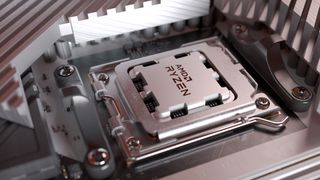AMD's mini Zen 4c cores could have Intel's Efficient cores well beaten
Zen 4c cores have multi-threading, but they're bigger than Intel's Efficiency cores.

Intel introduced its first hybrid desktop CPU architecture with a mix of Performance and Efficient cores, known as Alder Lake, back in late 2021. AMD isn't expected to offer its own hybrid CPU for consumers and gamers until Zen 6 arrives and so probably not until 2026.
However, AMD has engineered some new smaller cores roughly equivalent to Intel's E-cores, known as Zen 4c, and they could be quite a bit more powerful than Intel's.
Semianalysis has a deep dive on 4c and there are a few take-away highlights. First, AMD's small cores are bigger. Intel fits roughly four Efficiency cores into the space of one Performance core. AMD's Zen 4c cores are about half the size of full Zen 4 cores, as found in its latest Ryzen 7000 CPUs.
More broadly, Zen 4c seems to be functionally much closer to a full Zen 4 core, but rearchitected for efficiency. Apparently, just redesigning the cores to a lower clockspeed target allows the core to be much smaller without losing any functionality.
AMD's Zen 4c cores also support multi-threading, with two threads per core just like Zen 4. Intel's Efficient cores, on the other hand, don't have multi-threading support. The net result is that you can probably expect the IPC on Zen 4c cores to be a lot closer to Zen 4 than Intel's E-core IPC gets to its Performance cores.

Best gaming PC: The top pre-built machines from the pros
Best gaming laptop: Perfect notebooks for mobile gaming
The caveat to all this is that AMD's small cores are years away from being introduced in gaming PCs. By the time Zen 6 CPUs roll out, Intel will have iterated its Efficient cores a few times.
But this early look at Zen 4c implies that Intel's small cores will face some stiff competition. It also suggests that Intel and AMD are going in slightly different directions with their small cores. Intel is aiming to pack lots of them at the relative cost of per-core performance—purposefully looking to add more threads for parallel workloads—while AMD's smaller cores are shaping up to offer higher performance but perhaps not offering as many threads.
The biggest gaming news, reviews and hardware deals
Keep up to date with the most important stories and the best deals, as picked by the PC Gamer team.
That difference may reflect the fact that AMD's Zen 4c cores will first appear in server chips containing exclusively those smaller cores and no full fat Zen 4 cores. Whatever the reason, it's probably fair to say that Intel's 12th and 13th Gen Alder Lake and Raptor Lake CPUs have been very effective. So, it's surely only a matter of time before AMD takes a similar if not identical to consumer CPU design.

Jeremy has been writing about technology and PCs since the 90nm Netburst era (Google it!) and enjoys nothing more than a serious dissertation on the finer points of monitor input lag and overshoot followed by a forensic examination of advanced lithography. Or maybe he just likes machines that go “ping!” He also has a thing for tennis and cars.
Most Popular






